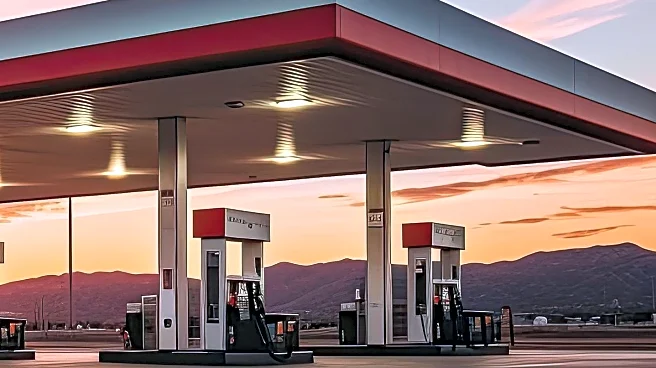What's Happening?
Consumer Reports has provided a series of strategies aimed at helping drivers maximize their fuel efficiency and savings as gas prices fluctuate. The report suggests using apps like GasBuddy to compare
local gas prices, which can often reveal better deals at stations located off highways or at warehouse clubs and large travel centers. Additionally, drivers are encouraged to look for the Top Tier gasoline sticker at pumps, indicating higher standard fuel available at stations such as Chevron, Costco, ExxonMobil, and Shell. The report advises against using premium fuel unless specifically required by the vehicle, and recommends maintaining at least a half-tank of fuel during winter months or when shortages are anticipated. Other tips include regularly checking tire pressure, especially in colder months, and removing roof racks and cargo boxes when not in use to improve aerodynamics.
Why It's Important?
These strategies are significant as they offer practical ways for consumers to manage fuel costs, which can be a substantial part of household expenses, especially during periods of price volatility. By adopting these practices, drivers can potentially reduce their fuel consumption and save money, which is particularly beneficial during economic downturns or when gas prices are high. The emphasis on using higher standard fuels and maintaining vehicle efficiency also contributes to better vehicle performance and longevity, which can lead to further cost savings in the long run. This guidance is crucial for consumers looking to mitigate the impact of fluctuating gas prices on their budgets.
What's Next?
As gas prices continue to fluctuate, consumers may increasingly turn to these strategies to manage their fuel expenses. The adoption of fuel-saving practices could lead to a broader awareness and demand for efficient fuel options and technologies. Additionally, as more drivers become conscious of their fuel consumption, there may be increased pressure on fuel providers to offer competitive pricing and higher quality products. This could also spur innovation in the automotive industry, with manufacturers focusing on developing more fuel-efficient vehicles and technologies.
Beyond the Headlines
The emphasis on fuel efficiency and cost-saving measures reflects a growing consumer awareness of environmental and economic sustainability. As drivers adopt these practices, there could be a positive environmental impact through reduced fuel consumption and emissions. This shift in consumer behavior may also influence policy discussions around energy independence and the development of alternative fuels. Furthermore, the focus on practical, everyday actions highlights the role of individual responsibility in addressing broader economic and environmental challenges.











